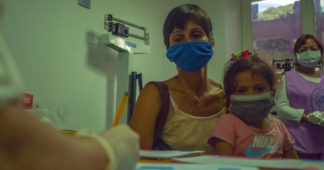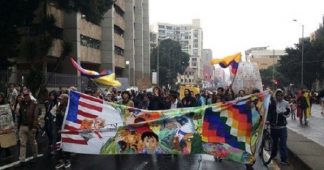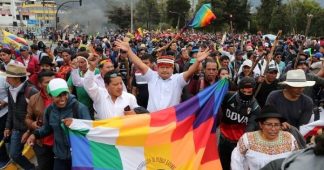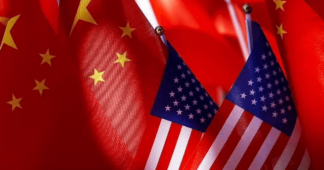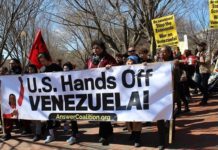The Mayan Council Chilam B’alam of the K’iches, the Mayan Council Komon Ajq’ijab’, the National Coordinator of the Territories of Life Network (Coordinadora Nacional Red Territories de Vida), the National Ajq’ijab’ Council “Oxlajuj Ajpop,” and the International Indian Treaty Council (IITC), inform the national and international communities that on May 4th, 2022 they presented a communication requesting urgent action by the United Nations Special Rapporteur in the field of cultural rights, the UN Special Rapporteur on Freedom of Religion or Belief, the UN Special Rapporteur on the Rights of Indigenous Peoples and the Committee on the Elimination of Racial Discrimination (CERD) Early Warning and Urgent Action Procedure.
The urgent communication was submitted in response to the first reading of Bill No. 5923, “Rescue of the Pre-Hispanic Heritage”, developed by the Congress of the Republic of Guatemala. Its provisions will cause the dispossession, privatization, and economic exploitation of two thousand seven hundred and fifty-four (2754) ceremonial centers, sacred sites, and other elements of Mayan spiritual, religious, and cultural heritage. Ceremonial areas in 22 Guatemalan departments will be impacted, including those surrounding Lake Atitlán in the department of Sololá which is sacred to the Maya Kaqchiles.
The submitting organizations are calling for urgent action by these UN human rights mandate holders to address the promotion of this Bill by the Guatemala Ministry of Culture and Sports, the Cultural Commission of the Congress, and the Congress itself, which in their view represents serious human rights violations and fails to comply with Guatemala’s obligations under various international and regional instruments affirming the rights of Indigenous Peoples. Specifically, if adopted, the Bill would violate Guatemala’s obligation to carry out effective consultations for the purpose of obtaining the Free, Prior and Informed Consent of the Mayan People, and would maintain the pattern of racism and discrimination carried out against the Indigenous Peoples of Guatemalan.
These Indigenous organizations call upon these thematic Rapporteurs and the CERD to take action in support of the Mayan People’s rights in accordance with their mandates and provide strong recommendations to address and remedy this urgent situation currently faced by the Mayan People.
For further information related to this note, please contact juanleon@treatycouncil.org or visit www.iitc.org.
For a copy of the full submission in Spanish only, click here.
LAS ORGANIZACIONES MAYAS DEMANDAN UNA ACCIÓN INTERNACIONAL PARA DETENER LAS VIOLACIONES DE SUS DERECHOS CULTURALES, ESPIRITUALES Y RELIGIOSOS Y EL DESPOJO DE SUS CENTROS CEREMONIALES EN GUATEMALA
Lago Atitlán, Panajachel, Sololá, Guatemala. Enero de 2022.
Ciudad de Guatemala, 9 de mayo de 2022: El Consejo Maya Chilam B’alam de los K’iches, el Consejo Maya Komon Ajq’ijab’, la Coordinadora Nacional Red Territorios de Vida, el Consejo Nacional Ajq’ijab’ “Oxlajuj Ajpop” y el Consejo Internacional de Tratados Indios (CITI), informan a la comunidad nacional e internacional que el 4 de mayo de 2022 presentaron una comunicación solicitando una acción urgente al Relator Especial de las Naciones Unidas en el ámbito de los derechos culturales, al Relator Especial de las Naciones Unidas sobre la Libertad de Religión o de Creencias, al Relator Especial de las Naciones Unidas sobre los Derechos de los Pueblos Indígenas y al Procedimiento de Alerta Temprana y Acción Urgente del Comité para la Eliminación de la Discriminación Racial (CERD).
La comunicación urgente fue presentada en respuesta a la primera lectura del proyecto de ley No. 5923, “Rescate del Patrimonio Prehispánico”, elaborado por el Congreso de la República de Guatemala. Sus disposiciones provocarán despojos, privatización y explotación económica en dos mil setecientos cincuenta y cuatro (2754) centros ceremoniales, sitios sagrados y otros elementos del patrimonio espiritual, religioso y cultural maya. Las áreas ceremoniales de 22 departamentos guatemaltecos se verán afectadas, incluidas las que rodean el lago Atitlán en el departamento de Sololá, espacio que es sagrado para el Pueblo Maya Kaqchikel.
Las organizaciones solicitantes piden que estos titulares de mandatos de derechos humanos de la ONU tomen medidas urgentes para abordar la promoción de este proyecto de ley por parte del Ministerio de Cultura y Deportes de Guatemala, la Comisión de Cultura del Congreso y del propio Congreso, proyecto que para ellas representa graves violaciones de los derechos humanos e incumple las obligaciones de Guatemala en virtud de diversos instrumentos internacionales y regionales que afirman los derechos de los Pueblos Indígenas. Específicamente, si se aprueba, el proyecto de ley violaría la obligación de Guatemala de llevar a cabo consultas efectivas con el fin de obtener el Consentimiento Libre, Previo e Informado del Pueblo Maya, y perpetuaría el patrón de racismo y discriminación existente en contra de los Pueblos Indígenas de Guatemala.
Estas organizaciones indígenas hacen un llamamiento a estos relatores temáticos y al CERD a que tomen medidas en apoyo de los derechos del Pueblo Maya de conformidad con sus mandatos, y a que proporcionen recomendaciones firmes para abordar y remediar esta situación urgente que actualmente enfrenta el Pueblo Maya.
Para más información relacionada con esta nota, póngase en contacto con juanleon@treatycouncil.org o visite www.iitc.org. Para obtener una copia de la presentación en su totalidad, haga clic aquí.
We remind our readers that publication of articles on our site does not mean that we agree with what is written. Our policy is to publish anything which we consider of interest, so as to assist our readers in forming their opinions. Sometimes we even publish articles with which we totally disagree, since we believe it is important for our readers to be informed on as wide a spectrum of views as possible.


